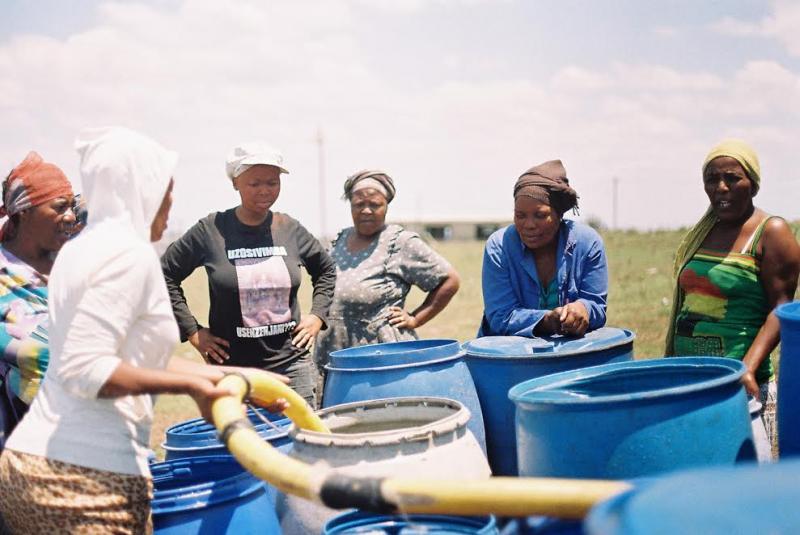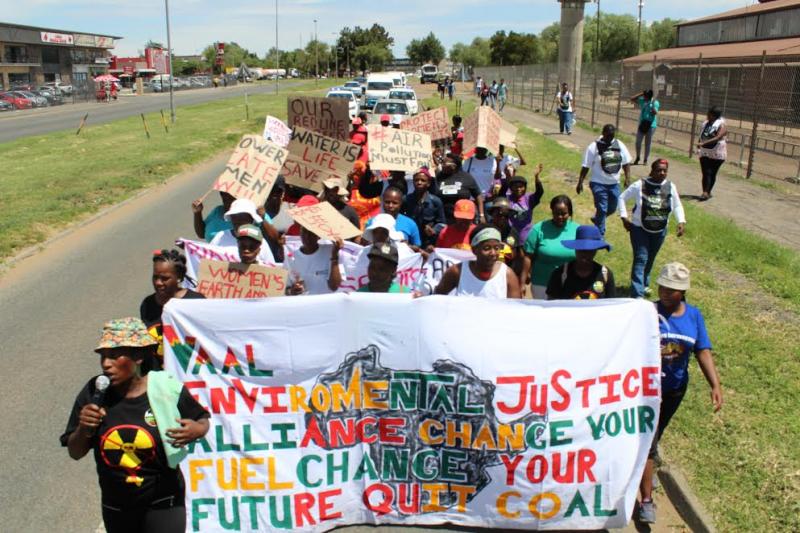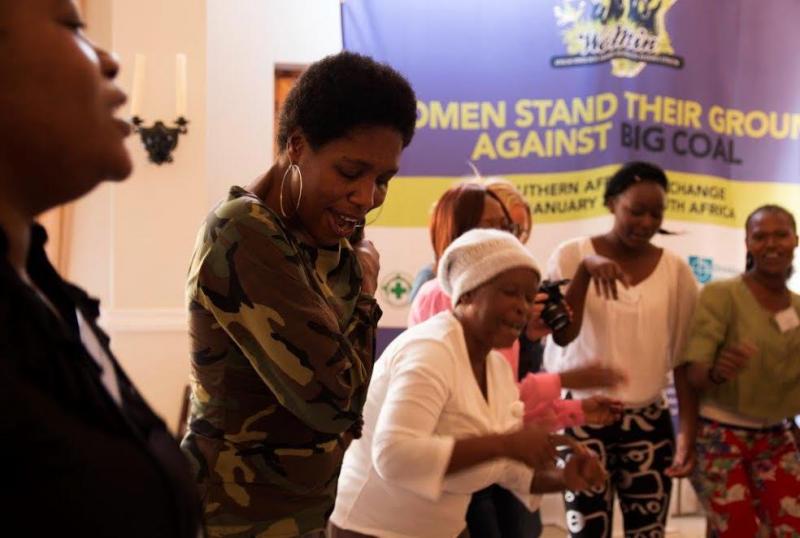Importante y urgente: Las mujeres africanas se unen contra la extracción destructiva de los recursos
Buscamos una alternativa posextractivista y ecofeminista para el desarrollo
Las mujeres de las comunidades de Somkhele y Fuleni en KwalaZulu-Natal, Sudáfrica, han tomado el asunto en sus manos. Como principales cuidadoras y creadoras de la subsistencia, las mujeres han sido las más afectadas por la crisis hídrica, que es el resultado de una combinación de sequías y de la intensa explotación de carbón en las cercanías de sus hogares.

«Lo primero que nos molestó de la mina es donde está construida, donde extraen el carbón y donde instalaron las oficinas. Ese era el lugar donde vivíamos. Allí es donde cultivábamos y de donde extraíamos el agua. Llegaron y bloquearon nuestros ríos, de modo que ahora no podemos recolectar agua. Ahora mismo no tenemos agua en ningún lado, al agua la compramos».
– Smangele Nkosi from Somkhele, en «No Good Comes from the Mine» [Nada bueno sale de la mina], un documental de WoMin.
Gracias al compromiso y el apoyo de WoMin, una alianza africana sobre género y actividades extractivas, las mujeres de estas dos comunidades vienen reforzando de manera colectiva sus procesos de organización y resistencia contra la explotación de carbón, en especial contra la mina Tendele.
Según WoMin, estos procesos de organización local de mujeres campesinas y de la clase trabajadora de la comunidad deberían estar en la agenda del 61º período de sesiones de la Comisión Jurídica y Social de las Mujeres, que se está celebrando actualmente en la Sede de las Naciones Unidas, en la ciudad de Nueva York. Es imperativo «analizar cómo debería ser el empoderamiento de las mujeres en un mundo laboral cambiante», así como contar con una evaluación más clara y crítica de los contextos actuales, a fin de fortalecer la influencia del trabajo de nuestros movimientos.
Impacto de género
«Las repercusiones del extractivismo sobre los cuerpos, la sexualidad y la autonomía de las mujeres no se pueden subestimar [...] Las industrias extractivas tienen un enorme impacto en la tierra y el agua, que son los recursos comunitarios que las mujeres emplean para sostener la subsistencia de sus familias y comunidades».
WoMin explica que «debido a la desigualdad y las divisiones del trabajo según el género», las mujeres asumen el rol de la reproducción social (trabajo no remunerado) en las comunidades de la clase trabajadora y entre las mujeres campesinas africana. Es por esto que sobre ellas recae, en gran medida, el impacto de las industrias extractivas.
La alianza también subraya que los análisis de las políticas regionales han omitido el impacto de género de las industrias extractivas, sobre todo el vínculo entre minería, extractivismo y violencia contra las mujeres.

La violencia se manifiesta de distintas maneras, por ejemplo, en los conflictos, cuando las corporaciones y los Estados emplean la táctica «divide y vencerás» para forzar las decisiones de la comunidad en favor de la actividad extractiva. La expropiación de las tierras obliga a las comunidades a dejarlas para dar lugar a los intereses extractivos, comunidades que luego quedan con escasos recursos para sostenerse y procurar su subsistencia. Esto significa que es necesario contar con alternativas de desarrollo que aborden los altos niveles de violencia interpersonal contra las mujeres en la familia y la comunidad, y establecer el vínculo entre la violencia estatal y la que auspician las corporaciones ejercida en las zonas donde operan las industrias extractivas. Otro efecto grave de la industrialización basada en los minerales es el cambio climático, que causa sequías y escasez de agua, también con efectos adversos en la producción agrícola. A la vez, debido a las divisiones de género del mundo del trabajo y el rol reproductivo de las mujeres, estas experimentan una carga desproporcionada de los impactos adversos.
«A menudo, desde la perspectiva de las mujeres y la de las comunidades, parece que los costos de la extracción minera y petrolera superan los beneficios, beneficios que disfrutan sobre todo la élite local y gobernante, las empresas y los inversores».
Importante y urgente. Las mujeres deben encabezar y definir el cambio y las alternativas
El trabajo de WoMin resulta de extrema importancia y urgencia en el contexto mundial actual. La alianza no solo se dedica a exponer los efectos adversos de la minería sobre las mujeres, sino que además trabaja para aportar alternativas de desarrollo ecofeministas y posextractivistas.
«El paradigma de desarrollo actual no está pensado para tomar en cuenta la voz de las mujeres, mucho menos la de las comunidades más directamente afectadas por la industrialización basada en los minerales y otras actividades extractivas (incluidas las empresas agrícolas)».
Las mujeres que se organizan en el ámbito local y que integran movimientos de base «deben encabezar y definir el cambio y las alternativas». Un componente de extrema importancia del trabajo de WoMin es la labor con organizaciones, comunidades y movimientos nacionales y locales en los países, incluidos Sudáfrica, Kenia, Zimbabue, Uganda, la República Democrática del Congo y Nigeria. Aunque las comunidades de esos países se enfrentan a diversas formas de industria extractiva, «cada una cuenta una historia similar sobre la impunidad corporativa y la connivencia estatal que vulnera constantemente los derechos a la vida y la subsistencia de las comunidades y las mujeres».
Resistencia y resiliencia

Con el fin de llevar adelante procesos locales de organización resilientes y efectivos, crear estrategias para el «ahora» y fortalecer el análisis para aportar información a la transición a largo plazo hacia una sociedad posextractivista, WoMin trabaja arduamente para crear campañas y proyectos nacionales y regionales.
Los folletos (en inglés) Women Building Power [Mujeres y construcción de poder] ofrecen soluciones prácticas para los problemas energéticos que afectan a las comunidades, para que puedan sostenerse a sí mismas y a la vez organizarse en pos de cambios más generales, incluida la justicia climática. Su séptimo folleto de tipo práctico ‘todo en uno’ contiene investigaciones, información y herramientas.
Es además un precursor de la próxima campaña regional africana liderada por mujeres sobre energía, combustibles fósiles y justicia climática. «La campaña busca construir un movimiento de mujeres que genere cambios profundos en la forma de producir y distribuir la energía en nuestros países y en África en general».
Para mostrar la poderosa resistencia de las mujeres de Somkhele y Fuleni y de las mujeres de las comunidades de Uganda –y potencialmente de Níger o la República Democrática del Congo–, WoMin está trabajando en el documental (en inglés) No Good Comes from the Mine [Nada bueno sale de la mina], una pieza panafricana basada en testimonios de la gente.
«Cuanta la historia de mujeres cuyas vidas se ven perjudicadas por la minería y otras formas extractivas. Habla también de su lucha por proteger y reclamar por sus tierras, su subsistencia, sus cuerpos y sus vidas. El documental muestra sus realidades cotidianas y cómo se están movilizando para resistir y protestar contra las injusticias».
El perfil de esta organización afiliada se publicó en conexión con el 61º período de sesiones de la Comisión Jurídica y Social de las Mujeres (CSW61) y su tema prioritario para este año «El empoderamiento económico de las mujeres en el cambiante mundo del trabajo».
El tráiler del documental de WoMin (en inglés):
